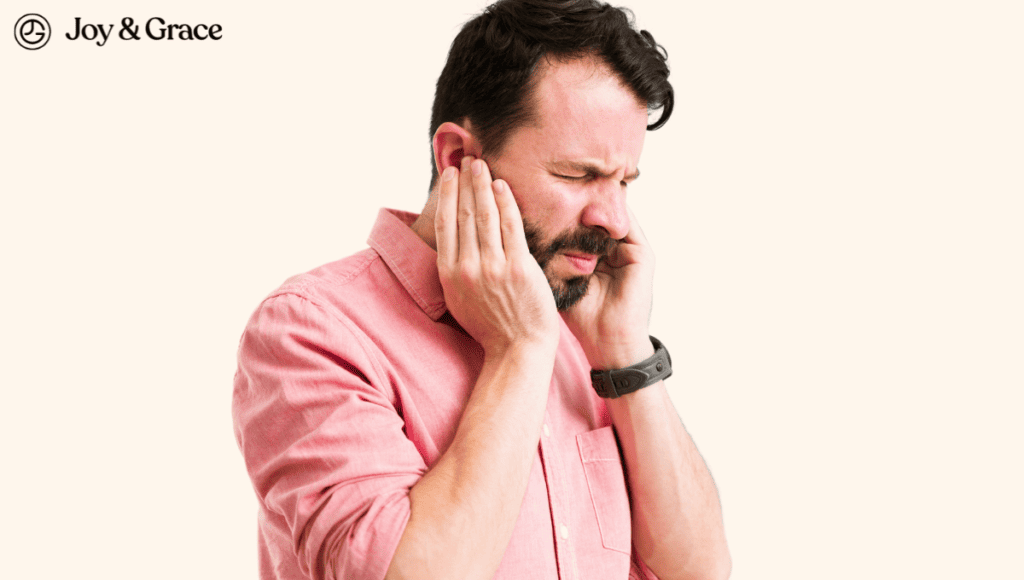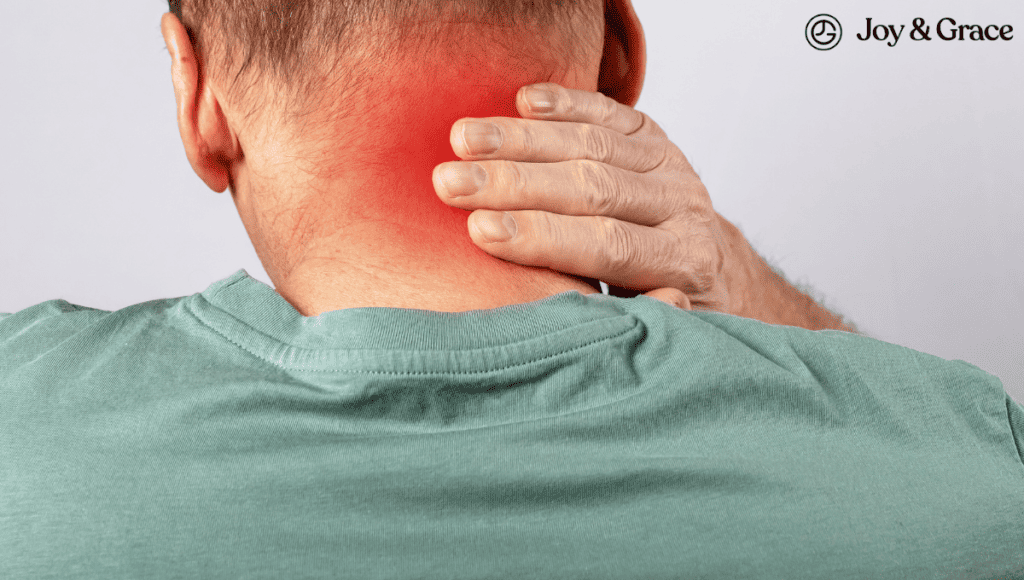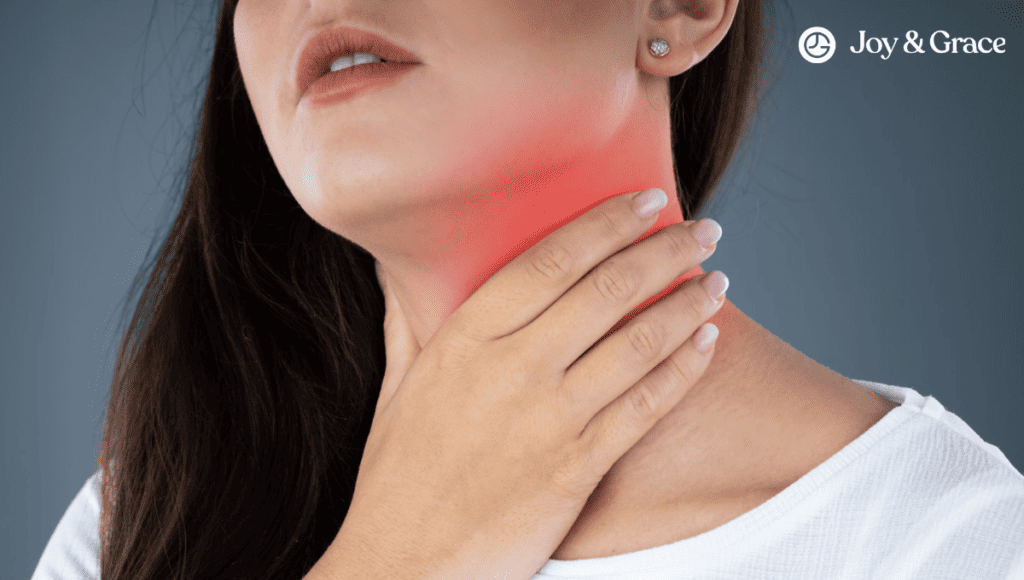Ear ringing can be a real fuss to deal with, especially if it’s constant. This description holds for neck pain as well. If you’ve ever had ear ringing, you’ll probably know there’s a mysterious and bizarre air to it. But could ear ringing somehow be related to neck pain? Could neck pain itself be causing it? If so, does soothing neck pain also get rid of ear ringing? The relationship between your neck and ears may be even closer than it seems.
Can Neck Pain Cause Ear Ringing (Tinnitus)?
To answer shortly, yes. Some neck problems that cause neck pain can also lead to ear ringing. Neck pain is a frequent complaint worldwide. It can go with many different symptoms, including those that are ear-related.
Ringing in the ear, on the other hand, is a symptom rather than a medical condition itself. Doctors often refer to ear ringing as tinnitus.
Tinnitus is usually a ringing sound inside the head without any external source. People commonly describe it as a buzzing, roaring, whistling, or chirping sound. You may feel tinnitus in one ear, both ears, or in the head. This mysterious-appearing sound may come and go, or it may be constant. Tinnitus can be further grouped as:
- Subjective
This is the most common form of tinnitus. If you have subjective tinnitus, it means only you can hear it. Subjective tinnitus often appears after exposure to excessive sounds (like after a concert).
- Objective
Objective tinnitus is the opposite of subjective tinnitus. Hence, if you have objective tinnitus, other people can hear it, too. This type may be associated with auditory tube disruption (we’ll elaborate later).
- Sensory
Sensory tinnitus occurs when there are changes in how the brain processes sound. Disorders that affect the sound processing pathway (like Meniere’s disease) may give rise to sensory tinnitus.
- Somatic
Somatic tinnitus is related to movement and touch, such as muscle tension or spasm. Sometimes, tinnitus may be somatosensory (a mixture of the somatic and sensory types). Somatosensory tinnitus goes with the activation of the sensory, motor, and visual nerve pathways.
- Pulsatile
This is a rhythmic tinnitus that synchronizes with your heartbeat. It’s associated with blood flow changes in the neck.
Despite their connection, tinnitus and neck pain don’t always go hand-in-hand. Ear ringing may also arise from other causes (which we’ll talk about). Let’s first see how its relationship with the neck fares.
What Part of the Neck Causes Tinnitus?
Tinnitus is usually associated with cervical neck pain. This area, located at the back of the neck, includes the top part of the spine.
The spine here is made up of seven bones called the cervical vertebrae. They’re stacked on top of each other.
The cervical part of the neck is located posteriorly (on the backside). It contains the uppermost portion of the vertebrae. The vertebrae are bones that stack on top of one another to form a column (the vertebral column). There are seven cervical vertebrae.
The back part of the neck also comprises muscles and lots of nerves. These neck muscles may get tense and hurt for various reasons. Likewise, neck nerves may get pinched or damaged, resulting in pain and associated ear ringing.
What Neck Problems Cause Ringing?

So far, we’ve established that various neck-related conditions can cause tinnitus. Let's see what they are before we elaborate on how they lead to ear ringing.
1. Poor Head Posture
Bad posture might seem like another habit that doesn’t do much harm, right? Well, wrong! A bad posture may have dangerous consequences for your health and quality of life.
Forward head posture is a type of poor posture in which the head is positioned forward relative to the neck. Due to its abnormal placement, the head can feel much heavier.
The added weight falls on the neck and shoulder muscles, which must work extra hard to hold it. It takes a mere inch of forward head posture to increase the weight on the neck muscles and ligaments by 10 pounds. Hence, the neck and shoulder muscles might become strained.
As a result, neck pain and associated tinnitus may occur.
Unfortunately, poor posture is quite common nowadays. Those who work in front of a computer screen for long periods may be at increased risk.
2. Cervical Instability
Cervical instability describes a loose, hypermobile, and unstable cervical neck. An unstable cervical neck contains vertebrae with an increased range of motion. This means they move more than they’re normally supposed to. Such a change often arises from weakened ligaments that hold the vertebrae together.
An unstable neck may arise from neck trauma, overuse injuries, or age-related degeneration. It may also be more common in people with connective tissue disorders and Down syndrome.
Cervical instability may affect several body systems and typically manifests as:
- Neck pain and headaches
- Ear-related symptoms (like ear ringing, ear fullness, and hearing problems)
- Vision problems
- Mood changes
- Digestive problems
- Skin changes, etc.
3. Stress: Can Neck Stress Cause Tinnitus?
Stress can tense up your whole body, including your neck. When it becomes persistent and chronic, the tension builds up and may lead to discomfort. We’ll discuss the effects of stress on neck problems and associated ear ringing in more detail below.
4. Whiplash Injury (and Other Head and Neck Traumatic Injuries)
Whiplash is an injury to the neck that happens when the head is jerked back and forth quickly. It typically happens during unexpected accidents where another car hits yours from behind. A whiplash injury may also occur while playing sports or from falls.
In fact, any trauma to the head and neck may potentially damage muscles or nerve connections in the neck. This may result in pain and tinnitus, among other symptoms.
5. Overuse Injury
Overuse neck injuries happen when you strain your neck muscles too intensely or for too long. These injuries typically happen when lifting heavy weights. The strain may translate to neck pain, which may then spread to the ear and cause additional symptoms such as ear ringing.
6. Cervical Spondylosis (Osteoarthritis)
Cervical spondylosis is age-related wear and tear of the neck vertebrae.
According to a 2020 study, degeneration of the neck vertebrae may lead to tinnitus by affecting cervical nerves. The cervical nerves come out of the spinal cord and follow through on both sides of the neck.
7. Bad Sleeping Habits
A good night’s sleep can do wonders for your health. On the other hand, bad sleep habits can really harm your well-being. It’s no surprise that paying little attention to your sleep quality can negatively impact your posture and neck muscles. Poor sleep can lead to neck strain and, as a result, pain and tinnitus. How can you fix your sleeping patterns? Here are ten quick tips:
- Make a regular sleep schedule.
- Ensure you’re sleeping at least 7-8 hours a night.
- Choose pillows and bedding that feel comfortable to you.
- Consider using a supportive pillow or a neck brace.
- Darken your sleeping room.
- Make sure your room is quiet.
- Avoid using electronics or having a meal two hours before sleep.
- Try to sleep on your back and side. Avoid stomach sleeping.
- When sleeping on your side, align your head and neck with the rest of your body.
- Consult your doctor for pre-sleep medications and other therapies.
Why is My Ear Ringing?
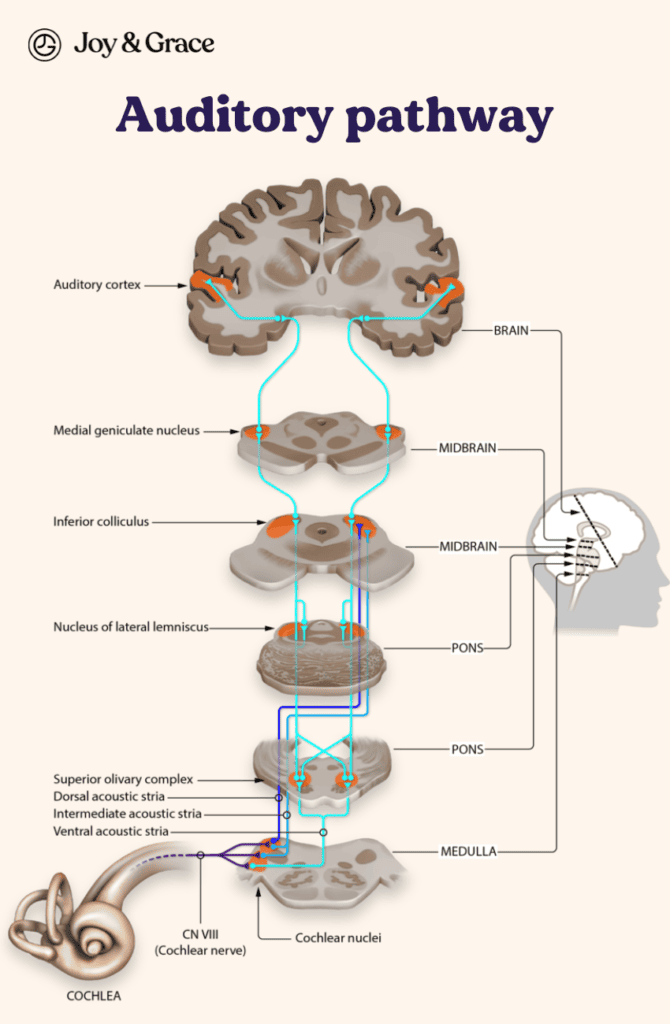
Now that we know the main causes of neck-related tinnitus, how and why does it exactly arise? What are the mechanisms behind it?
Tinnitus can happen anywhere along the “auditory pathway.” The auditory pathway is the path that perceives and interprets sound. It begins in the outer ear, continues through the middle and inner ear, and ends in the brain. The brain has a particular part that analyzes and stores sound.
Many theories have tried to explain the mechanisms of tinnitus. These mechanisms may occur together or even lead to one another.
Let’s explore some prevalent theories to unravel this mystery.
1. Increased Muscle Tension: Can Tight Neck Muscles Cause Tinnitus?
Yes, tight or tense muscles in the neck may indeed cause tinnitus. In fact, some researchers think relieving muscle tension should be one of the targets for tinnitus treatment. Let’s see how precisely muscle tension relates to tinnitus.
How Does Muscle Tension Cause Tinnitus?
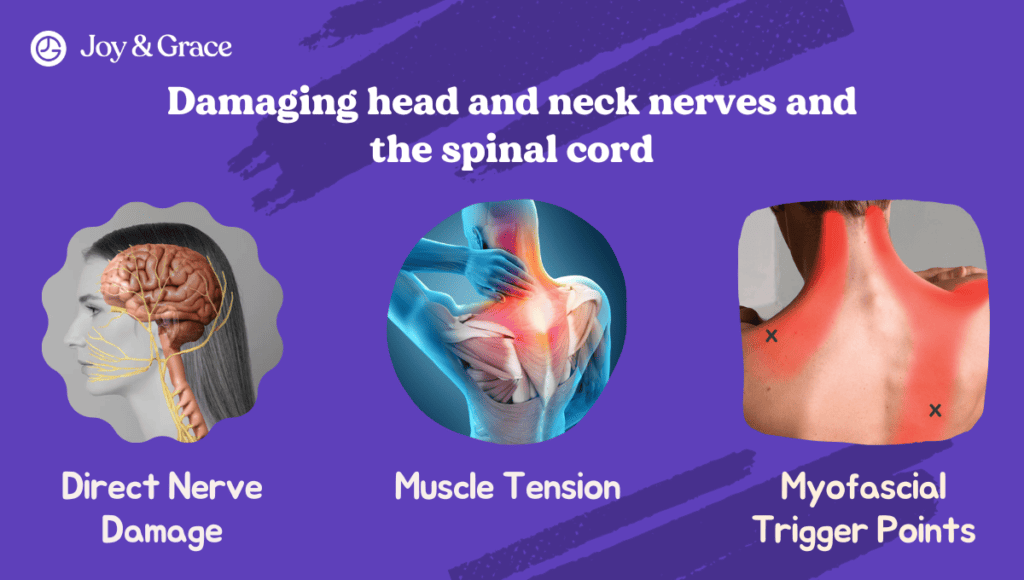
Many neck muscles interconnect directly with the muscles of the shoulders, back, and jaw. Neck muscle tension may result in tinnitus, directly or indirectly, by:
- Damaging head and neck nerves and the spinal cord
- Direct Nerve Damage
A 2011 study review analyzed various theories behind the cause of tinnitus. One theory suggests tight neck muscles might directly damage neck nerves. These may include the vagus nerve, trigeminal nerve, and peripheral cervical nerves that come out of the spinal cord.
The vagus nerve is the tenth cranial nerve. It regulates heart rate, breathing, digestion, and Eustachian tube function, among other roles. - Muscle Tension Altering The Perception of Touch and Vibration
Other theories further mention that muscle damage and tension may change the way you perceive touch and vibration. These nerves (so-called afferent nerves) may link to the same central areas as auditory pathways. Hence, muscle function may interfere with sound processing, potentially causing tinnitus. - Myofascial Trigger Points
Another interesting point is the correlation between tinnitus and cervical myofascial trigger points. These trigger points are certain locations in the neck muscles that are overly sensitive to pain. Thus, they’re crucial to muscle pain. A 2018 study supports the relationship. It states that manipulating neck trigger points might change how you experience ear ringing.
- Direct Nerve Damage
- Disrupting Eustachian (auditory) tube function
The eustachian, or auditory tube, connects the middle part of the ear to the throat. It plays a key role in ear function. Tight neck muscles can impact cranial nerves, which regulate Eustachian tube muscles. As we'll explain below, this can lead to symptoms by disrupting the tube.
- Affecting the jaw muscles
Tight and stiff neck muscles are often associated with temporomandibular disorder (TMD/TMJ). TMD represents pain and changed function at the jaw joint and surrounding chewing muscles. It may also be associated with ear-related symptoms like tinnitus.
The Link Between Tinnitus and Temporomandibular Disorder (TMD)
Temporomandibular disorder (TMD) is significantly related to tinnitus. A 2014 study found that the risk of tinnitus is eight times higher in people suffering from TMD.
The symptoms of TMD often include the following:
- Pain around the jaw, ear, and neck
- Headache around the temples
- Clicking, popping, or grinding noises when moving the jaw
- Difficulty opening your mouth
- One-sided ear ringing (on the same side as the jaw problem), which gets worse with jaw movements
There are several potential causes of TMD:
- Teeth grinding (Bruxism)
- Wear and tear degeneration of the jaw joint
- A head or neck injury
- An uneven bite
- Stress.
Can Tight Shoulder and Neck Muscles Cause Pulsatile Tinnitus?
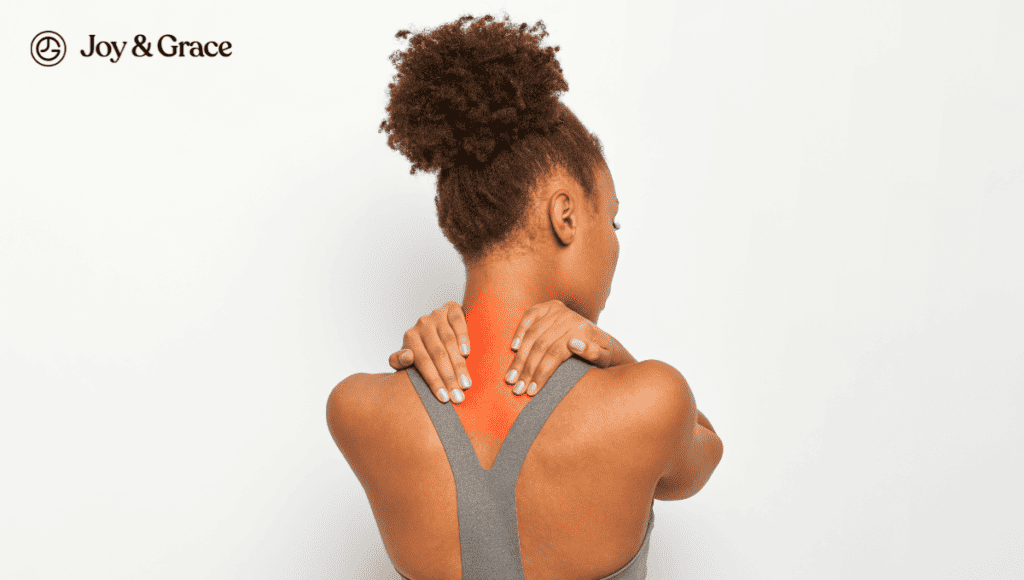
Yes, tight shoulder and neck muscles may cause pulsatile tinnitus. Increased muscle tension is associated with neck pain, which, in turn, may be associated with tinnitus.
However, pulsatile tinnitus occurs more commonly when a large blood vessel in the neck is obstructed. An example of such a vessel is the carotid artery, a crucial vessel that supplies many head and neck regions.
If you’ve experienced pulsatile tinnitus before, you’ll know it’s a whooshing, throbbing, or buzzing sound that follows the rhythm of your pulse. Pulsatile tinnitus is a type of objective tinnitus, as other people around you can also hear it.
Pulsatile tinnitus should never be ignored. If the mentioned signs and symptoms sound familiar, we encourage you to seek your doctor’s opinion.
Which Neck Muscles Cause Tinnitus?
Studies suggest that tinnitus is frequently associated with the posterior cervical muscles.
This group includes small and large muscles separated into superficial and deeper layers. Many posterior cervical muscles (especially the small ones) are supplied by nerves with similar paths to the auditory pathway.
2. Eustachian (Auditory) Tube Dysfunction
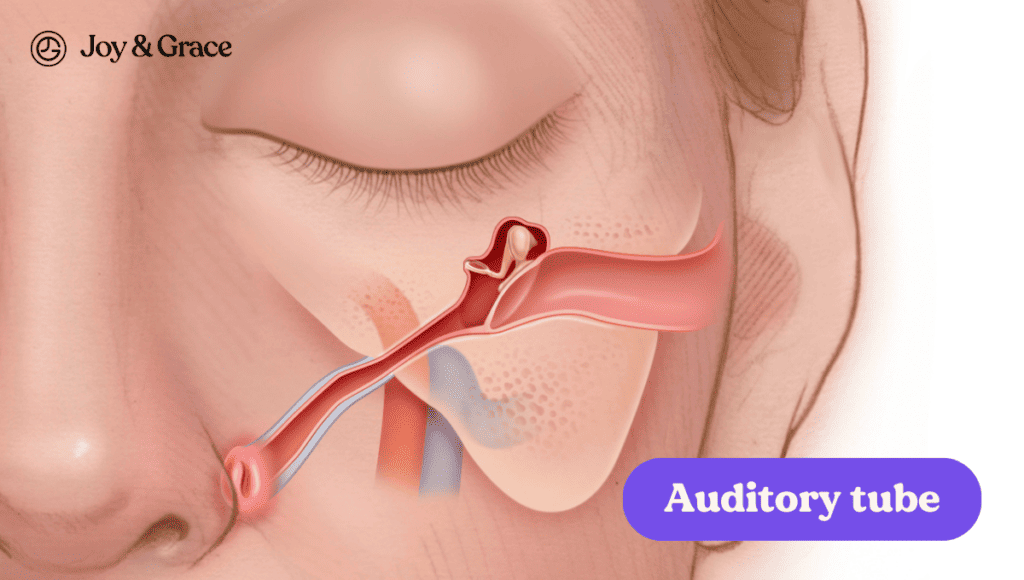
As mentioned, the eustachian tube is crucial to ear function. It plays a part in:
- Balancing the pressure inside the middle ear with the outside pressure
You might be familiar with the “popping” sound that your ears make occasionally. That’s your Eustachian tube being the pressure equalizer.
- Draining excess fluid from the middle part of the ear
- Protecting the ear from loud sounds and nasal fluids entering
It goes without saying that dysfunction of this tube leads to abnormal changes like:
- Ear pain and fullness
- Tinnitus
- Hearing changes
The Eustachian tube opens or closes thanks to four muscles:
- Tensor veli palatini
- Levator veli palatini
- Salpingopharyngeus
- Tensor tympani
The trigeminal and vagus cranial nerves are responsible for supplying these muscles, respectively. Tight and painful neck muscles or cervical instability may lead to damage to these nerves. Consequently, muscle dysfunction may appear. Surely enough, muscle dysfunction leads to tube dysfunction and symptoms like tinnitus.
3. Pressure on the Nerves: Can Nerve Damage in the Neck Cause Tinnitus?
As you might expect, the answer is yes. The neck region is a congested (but highly regulated) traffic of nerves. Countless impulses go up to the brain and down to the rest of the body quickly and efficiently through the neck. Understandably, nerve damage in the neck can manifest as symptoms in other body parts. One example of such symptoms is tinnitus.
- Cranial (head) nerves
As mentioned, the trigeminal and vagal nerves are closely related to the auditory pathway. Another cranial nerve that may potentially be affected is the glossopharyngeal nerve. Damage to these three nerves may also cause eustachian tube dysfunction and lead to ear ringing.
- Cervical (neck) nerves and roots
Damage to the upper and lower cervical nerves may result in tinnitus and ear pain, too. The cervical part of the spine gives rise to eight cervical nerves (C1-C8).
- The spinal cord
Compression of the spinal cord may cause faulty nerve impulse transmission. This usually happens with spinal stenosis or injuries. Spinal stenosis represents increased pressure on the nerves exiting the spinal cord because of:- Osteoarthritis (wear-and-tear degeneration of the vertebrae)
- Cervical instability
- Disc herniation (slipping of the discs between two vertebrae)
Can the C5 and C6 Nerves Cause Tinnitus?
Yes. Damage to the C5 and C6 cervical nerves can indeed cause ear ringing.
In fact, tinnitus may be associated with abnormalities at all cervical levels. For instance, a 2020 study analyzed a sample of patients with tinnitus and found that C8 nerve dysfunction was present in 26% of cases.
Moreover, the study showed that most of the patients had disc degeneration at the C5, C6, and C7 cervical levels. So, how do you recognize cervical nerve injuries? Start by looking for any associated symptoms! These kinds of injuries can also present with:
- Numbness,
- Tingling,
- Burning,
- Weakness,
- Vision changes
4. Pressure on the Blood Vessels: Can Neck Vessel Issues Cause Pulsatile Tinnitus?
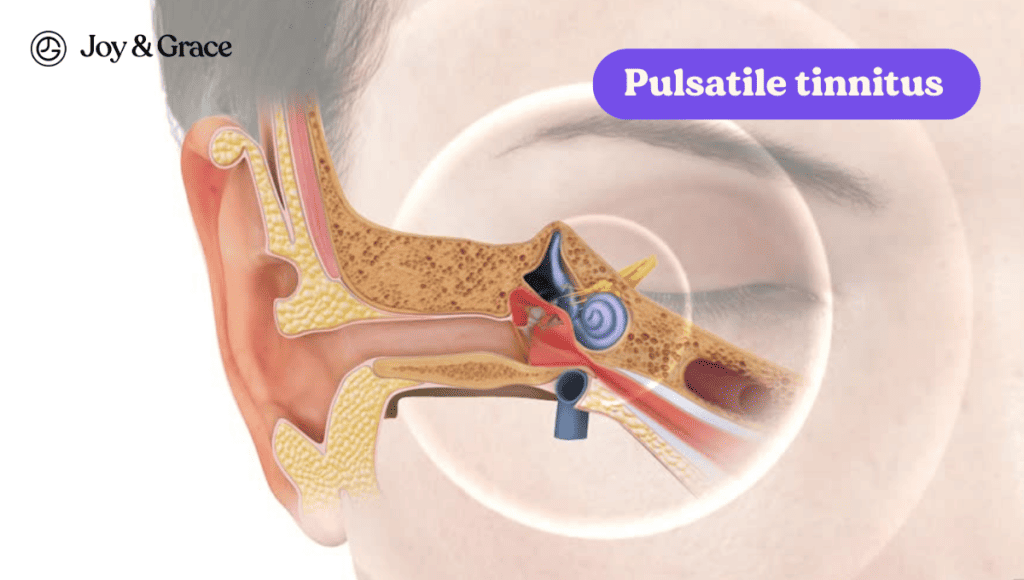
The answer here is also yes. As we said, pulsatile tinnitus usually occurs with a blood vessel abnormality in the neck near the ear. It’s characterized by thumps, whooshes, or throbs, which happen in sync with your heartbeat. Pulsatile tinnitus may arise from:
- Atherosclerosis (A hard plaque that builds up inside the arteries and narrows them)
- Blood vessel disorders and malformations (including aneurysms and arteriovenous malformations)
- Ear-related disorders (such as inner ear disorders)
- High blood pressure (leading to turbulent flow)
- Head and neck glomus tumors (benign tumors that may rarely occur in the middle ear or brain)
- Increased pressure inside the head (because of increased cerebrospinal fluid)
- Anemia
- Hearing loss
- Head injuries
- An overactive thyroid gland (hyperthyroidism)
The most commonly affected neck vessels are the carotid arteries and the jugular veins.
How is Cervical Tinnitus Diagnosed?
A correct diagnosis of somatosensory tinnitus typically starts with your medical history. As discussed, somatosensory tinnitus is a combination of the somatic and sensory types. It involves the sensory, motor (movement), and visual-motor pathways.
Your doctor may ask you questions and look for:
- Any previous history of head or neck trauma
- Tinnitus associated with manipulation of the teeth, jaw, or cervical spine
- Recurrent pain in the head, neck, or shoulder
- Pain in the temples
- Tinnitus that worsens in particular positions during rest walking, working, or sleeping
- Intense bruxism (teeth grinding) during the day or night
After taking a thorough history, your doctor may perform a physical examination. Physical examinations often involve checking for posture anomalies, mobility, and pain points.
Additional tests can help pinpoint the underlying cause and include:
- Audiological (hearing) tests
An audiogram evaluates the quality of tinnitus and any potential hearing loss.
- Imaging tests (which provide visuals of neck problems or malformations)
- MRI (Magnetic resonance imaging)
- CT scan (Computed tomography scan)
- Ultrasound imaging
The precise cause of tinnitus may sometimes be unknown. Other potential culprits and risk factors may not necessarily involve the neck. They may include:
- Exposure to loud noises (such as after a concert)
- Hearing loss
Hearing loss usually happens with aging or prolonged exposure to loud noises.
- Medications (like NSAIDs, certain antibiotics, anti-cancer drugs, anti-malaria medications, and antidepressants)
- Earwax or ear infections, which block the ear canal
- Ménière’s disease, an inner ear disorder that can also cause balance problems and hearing loss
- Tumor-related disorders (such as acoustic neuroma, a tumor of the hearing nerve)
- Chronic health conditions
These may include diabetes, migraines, thyroid disorders, anemia, and certain autoimmune disorders (lupus, multiple sclerosis).
Note: Visit your primary care physician (PCP) if you’re experiencing tinnitus and neck pain. A PCP is usually the first healthcare provider that can assess your complaints. If needed, your PCP may refer you to an ENT (ear, neck, and throat) specialist.
How Do I Get Rid of Tinnitus and Neck Pain?
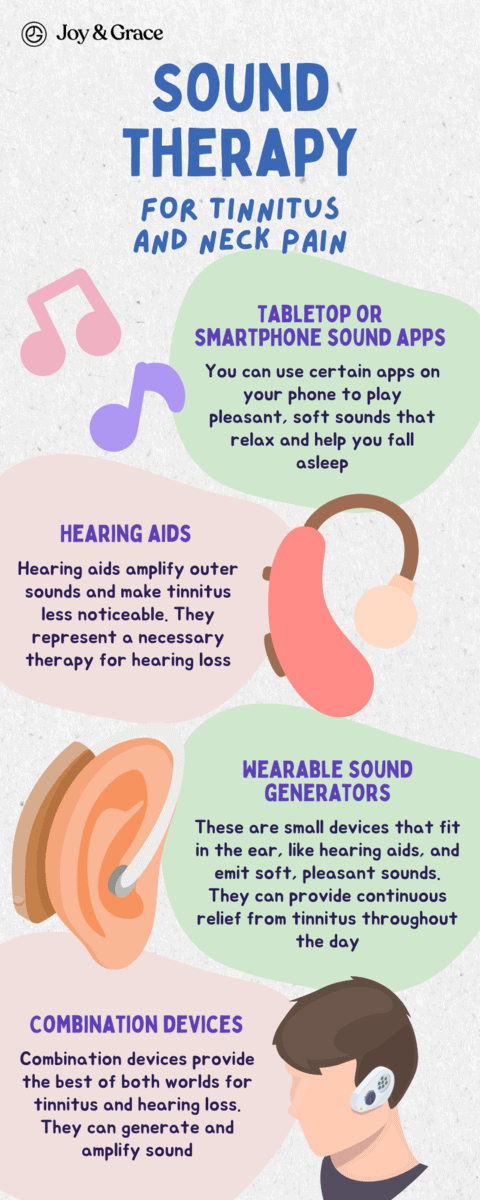
Now, for the million-dollar question: how to treat tinnitus associated with neck pain? Ear ringing and pain can often persist for months or even years. The first step to managing it is addressing your problem and finding the cause. Treating the underlying cause can reduce or eliminate the symptoms altogether.
Below, we list the most successful therapies for tinnitus and neck pain:
- Sound therapy (Tinnitus retraining therapy - TRT)
Sound therapy can potentially reverse some of the changes in tinnitus or even mask them. It intends to silence or mask tinnitus or even help you get distracted or get used to the sound. Sound therapy may be applied in the following forms:
a. Tabletop or smartphone sound apps
You can use certain apps on your phone to play pleasant, soft sounds that relax and help you fall asleep.
b. Hearing aids
Hearing aids amplify outer sounds and make tinnitus less noticeable. They represent a necessary therapy for hearing loss.
c. Wearable sound generators
These are small devices that fit in the ear, like hearing aids, and emit soft, pleasant sounds. They’re portable, meaning they can provide continuous relief from tinnitus throughout the day.
d. Combination devices
Combination devices provide the best of both worlds for tinnitus and hearing loss. They can generate and amplify sound.
- Cognitive behavioral therapy (CBT)
CBT is a type of therapy that teaches you how to recognize any negative, distressing thoughts. It advises you to focus on the changes that decrease the intensity of your tinnitus and neck pain. Thus, this approach may help you retrain your brain.
CBT is often a short-term therapy that can be applied for 2-6 months in weekly sessions. It can be used along with hearing devices.
- Biofeedback and stress management
Biofeedback is another therapy that aims to help you control your stress. The idea behind it is to teach you to adjust your body’s response to stressful situations. These may be situations that can trigger tinnitus.
- Medications
Your doctor may prescribe antidepressants or anxiolytics to improve your mood or sleep. According to trials, only nortriptyline, amitriptyline, alprazolam, clonazepam, and oxazepam can be beneficial. Recently, Botulinum-A toxin (botox) has also been used for the treatment of tinnitus.
Neck pain is usually managed with painkillers like Tylenol.
- Physical treatments
a. Physical therapy and exercises (we’ll discuss below)
b. Manipulation of the cervical spine and trigger point therapy
This therapy involves ischemic compression or inhibition. Ischemic compression means applying pressure with a finger on a trigger point. The pressure is applied until pain appears.
c. Mechanical therapy of the cervical spine and jaw
These focus on repetitive movements, joint mobilization, and soft tissue massage.
d. Electrical stimulation (TENS - transcutaneous electrical nerve stimulation)
Electrically stimulating the inner ear can suppress tinnitus with minimal to no trace. TENS uses electrodes placed on the skin to send electrical impulses through.
e. Traditional Chinese acupuncture
f. Cervical neck collar

- Qigong therapy
Qigong may also be an effective way of treating tinnitus. It’s an age-old Chinese medicine therapy that optimizes energy within the body, mind, and spirit. No side effects have been shown. The effects remain stable for at least three months after the last session.
Remember: Not all therapies may work for you. You may need to try various combinations before you find what’s best. Hence, consulting your healthcare provider beforehand is a must.
Can Tinnitus Caused by Neck Problems Be Cured?
Unfortunately, the answer in this case isn’t definitive. If something as simple as poor posture or increased muscular tension is causing your tinnitus, fixing the culprit might be curative in some cases.
While some vitamins, herbs, and supplements are said to get rid of tinnitus, none of them have been proven 100% effective. There is no FDA-approved drug treatment for tinnitus.
Physical Therapy: Can Neck Exercises Help Tinnitus?
Yes! Physical therapy, along with neck manipulation, may indeed ease tinnitus. Before you exercise, keep in mind that you ought to consult your doctor. You’ll want to start slowly and progress as you go.
Here are some tips to stretch your neck:
- Make a fist with your left hand and bring it to your left shoulder.
- Pull your fist and shoulder down.
- Place your right hand on the left side of your head, just above your ear.
- Pull your head to the right. You’ll feel a stretch on the side of your neck.
- Hold the stretch for 2-3 minutes.
- Slowly release and repeat the stretch on the other side.
Alternatively, you may:
- Start by looking straight ahead.
- Turn your head 45 degrees to the left.
- Pull your left shoulder down with your left hand.
- Place your right hand on the left side of your head (above your ear).
- Pull your head down at a 45-degree angle.
- Hold for 2-3 minutes.
- Release and repeat on the other side.
Where Do I Massage My Neck for Tinnitus?
According to a study review, massage and stretching of the neck and chewing muscles can effectively reduce tinnitus.
Myofascial trigger point massage is a type of massage that may just be what you need. It may soothe neck pain and tinnitus and improve the neck’s range of motion and life quality. Trigger point therapy focuses on specific sore spots or knots in the neck muscles. It aims to decrease pain and improve muscle function.
Remember: Massage therapy might not work for everyone despite the reported benefits. We highly encourage you to consult your doctor before following any massage tips.
Can Neck Massage Help Pulsatile Tinnitus?
As mentioned, some treatment techniques for tinnitus may help, while others may not. A neck massage shouldn’t be the first thing you do after experiencing pulsatile tinnitus.
Doctors often apply a finger over the front side of the neck to seek the cause of pulsatile tinnitus. This technique can differentiate between arterial and venous pulsatile tinnitus. A vein could've likely been affected if the tinnitus goes away after compressing the neck.
Remember: Because of its associated dangers, a medical professional should always be the one to evaluate pulsatile tinnitus. Consult a doctor if you notice any symptoms that suggest the presence of pulsatile tinnitus.
Takeaway
Neck problems associated with cervical neck pain can also lead to ear pain and ringing.
Tinnitus is usually a ringing sound inside the head without any external sound. It can be:
- Subjective
- Objective
- Sensory
- Somatic
- Pulsatile
Despite their connection, tinnitus and neck pain don’t always go hand-in-hand. Ear ringing may also arise from other causes.
Tinnitus is usually associated with cervical neck pain.
The most common causes of neck-related tinnitus include:
- Poor head posture
- Cervical instability
- Stress
- Whiplash and other head and neck injuries
- Overuse injuries
- Cervical spondylosis (neck osteoarthritis)
- Bad sleeping habits
Tinnitus can happen anywhere along the auditory pathway. The auditory pathway is the path that perceives and interprets sound. It begins in the outer ear, continues through the middle and inner ear, and ends in the brain.
Neck pain-associated tinnitus may arise from:
- Increased neck muscle tension
- Damage to neck nerves
- Eustachian tube dysfunction
- Neck blood vessel damage
These mechanisms may occur together or even lead to one another.
The risk of tinnitus is eight times higher in people suffering from temporomandibular disorder (TMD).
Pulsatile tinnitus is a special type of tinnitus. It occurs when a large blood vessel in the neck gets obstructed. An example of such a vessel is the carotid artery.
A correct diagnosis of somatosensory tinnitus typically starts with your medical history.
After taking a thorough history, your doctor may perform a physical examination. Physical examinations often involve checking for posture anomalies, mobility, and pain points.
Additional tests can help pinpoint the underlying cause and include:
- Audiological (hearing) tests
- Imaging tests (which provide visuals of neck problems or malformations)
Visit your primary care physician (PCP) if you’re experiencing tinnitus and neck pain. A PCP is usually the first healthcare provider that can assess your complaints. If needed, your PCP may refer you to an ENT (ear, neck, and throat) specialist.
Ear ringing and pain can often persist for months or even years. Treating the underlying cause can reduce or eliminate the tinnitus symptoms altogether.
The most successful therapies for tinnitus and neck pain include:
- Sound therapy (Tinnitus retraining therapy - TRT)
- Cognitive behavioral therapy (CBT)
- Biofeedback and stress management
- Medications
- Physical treatments
- Physical therapy and exercises
- Manipulation of the cervical spine and trigger point therapy (massage)
- Mechanical therapy of the cervical spine and jaw
- Electrical stimulation (TENS - transcutaneous electrical nerve stimulation)
- Traditional Chinese acupuncture
- Cervical neck collar
- Qigong therapy
There is no FDA-approved cure for tinnitus.
Myofascial trigger point massage may soothe neck pain and tinnitus and improve the neck’s range of motion and life quality. Trigger point therapy focuses on specific sore spots or knots in the neck muscles.
